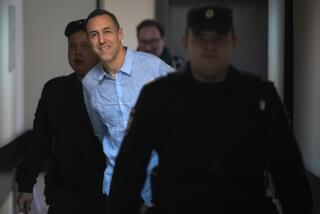Convicted Journalist Sees Threat in Ruling
- Share via
MOSCOW — A crusading journalist who was sentenced by a military court Tuesday to three years in prison but then released said the verdict was a warning against environmental activism and a sign of the continuing power wielded by a KGB successor.
Grigory M. Pasko, 37, a navy captain and military journalist, was charged with treason after he exposed the navy’s dumping of nuclear waste in the Sea of Japan. But he was convicted on a lesser charge--abuse of his position for personal gain--when the treason accusation was not proved. He then was released under an existing amnesty program for criminals convicted of minor charges.
Though he walked out of court in Vladivostok a free man after 20 months in jail, Pasko spoke angrily against his conviction.
“By passing this verdict, the court told the world: ‘Do not mess with the KGB, do not pry into those things which the KGB advises you to leave alone,’ ” Pasko said in a phone interview. He was referring to the Federal Security Service (FSB), the main successor to the KGB.
Pasko’s lawyers said they will appeal to the Russian Supreme Court for a full acquittal.
The case attracted the attention of international human rights organizations and heightened concerns about Russian authorities’ use of secrecy laws to gag environmental campaigners.
The verdict was a surprise, with Pasko’s supporters and lawyers predicting a conviction on the treason charge and the prosecution seeking a 12-year sentence. Pasko’s release brought cheers from spectators in the courtroom. His wife, Galina Morozova, fainted when the verdict was read.
“People burst into tears of joy and others stood up and applauded,” said Yuri S. Maximenko, an attorney and former intelligence chief of the Pacific Fleet. “Everyone was exultant, and people who did not even know each other started giving bear hugs to the people next to them.”
But Pasko did not celebrate. He said the verdict “confirmed one more time that innocent people put on trial on charges trumped up by the KGB have never been and never will be acquitted in Russia. Such people will always be pronounced guilty. The KGB and its flunkies will never acknowledge their mistakes or repent their sins.”
Pasko, a journalist for the Pacific Fleet newspaper Boyevaya Vakhta, or Combat Watch, was arrested in 1997 for freelance work he did for the Japanese television network NHK. He was accused of handing over a videotape showing Russian sailors dumping nuclear waste at sea in 1993. Pasko denied that he released classified material.
Despite the court’s decision to free Pasko, there is no sign that authorities were softening their stance toward those who expose nuclear pollution by the military.
Reports surfaced last week that FSB agents had recently raided the home of Vladimir Soifer, a scientist in Vladivostok. Soifer had contributed a chapter to a recent book produced by the Green Cross in Switzerland about a 1985 nuclear accident involving a submarine at Chazhma Bay near Vladivostok, in the Russian Far East.
And the Supreme Court last week ordered a new trial for former navy Capt. Alexander Nikitin, who was charged with treason in 1996 after helping the Norwegian environmental group the Bellona Foundation expose the dangers of nuclear submarines abandoned in northern Russia. Nikitin’s original trial ended last year without a verdict, and the case was sent back to the FSB for further investigation.
*
Alexei V. Kuznetsov of The Times’ Moscow Bureau contributed to this report.
More to Read
Sign up for Essential California
The most important California stories and recommendations in your inbox every morning.
You may occasionally receive promotional content from the Los Angeles Times.










